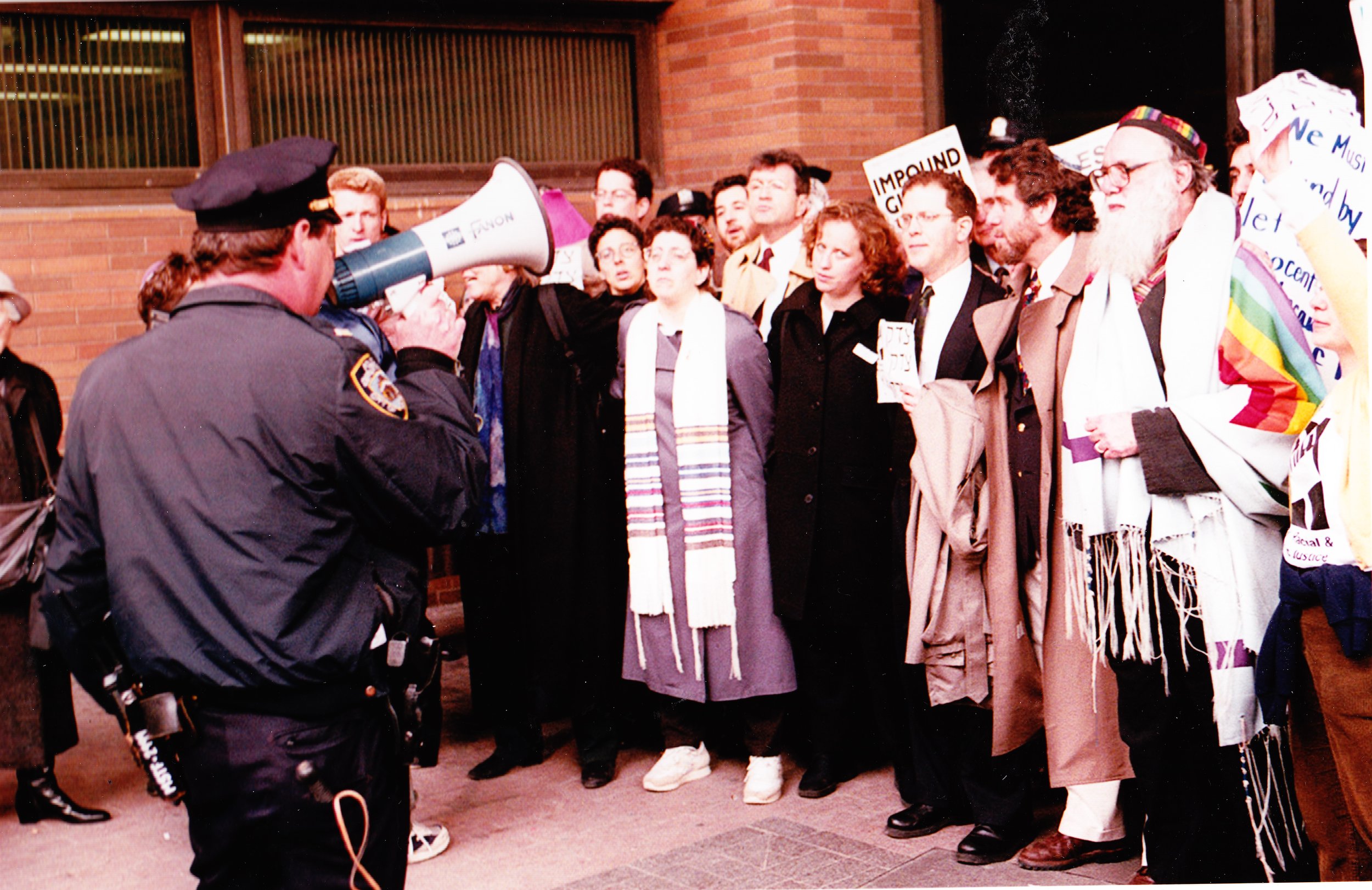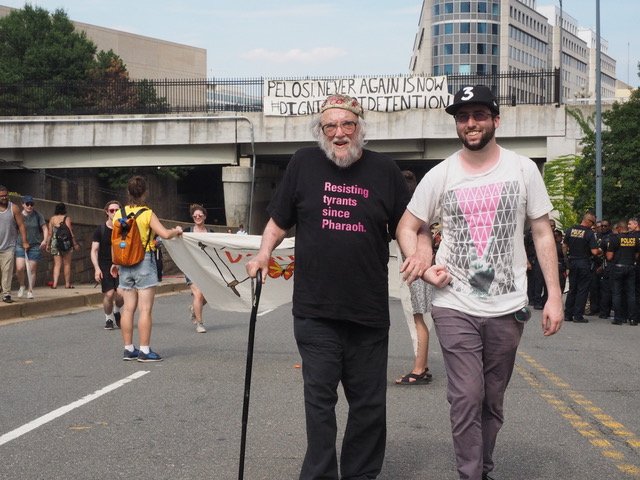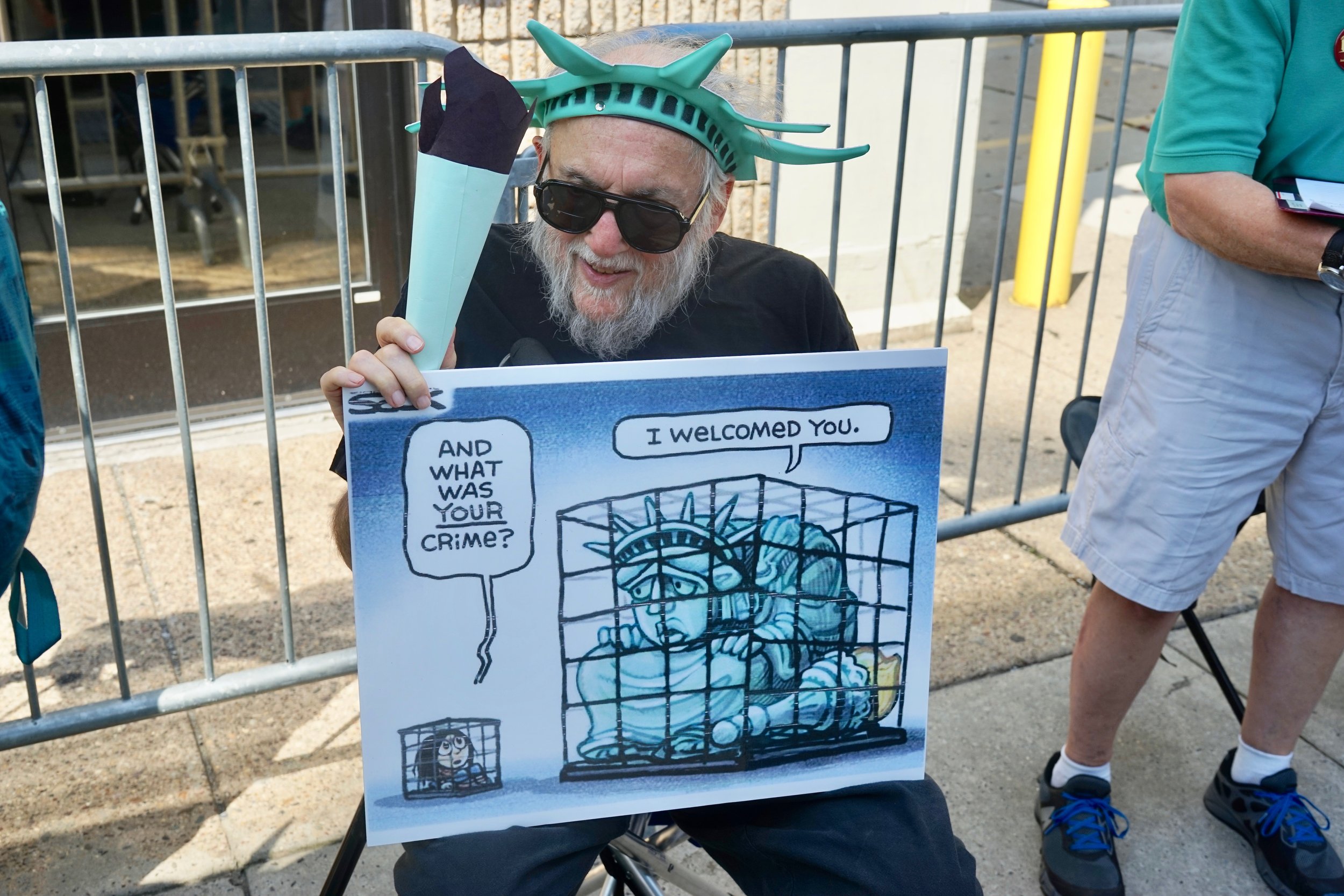
History
The Shalom Center was founded in 1983 to address the raging nuclear arms race from a Jewish perspective. Over 39 years, it has focused on issues such as climate, racism, women’s rights, LBTQIA+ rights, war and peace, and more.
1983-1993: From Founding to ALEPH
The Shalom Center was founded as a project of the Reconstructionist Rabbinical College by Rabbi Arthur Waskow, then a member of the RRC faculty, who became its director, and Ira Silverman, alav hashalom, then president of RRC.
Over the years, The Shalom Center has engaged in a variety of public actions, thought leadership, and more.
Beginning in 1991, with the collapse of the Soviet Union and the diminution of the nuclear arms race, The Shalom Center refocused on other planetary ecological dangers. Waskow developed both a theology and practice of eco-Judaism and wrote several books on those questions, while The Shalom Center went forward with these issues.
From 1978 on, Waskow's interests in tikkun olam had gone hand in hand with his work on spiritual/ liturgical / ceremonial concerns. The journal he founded, New Menorah, became the journal of the P'nai Or Religious Fellowship, and simultaneously, the concerns of P'nai Or for liturgical and spiritual creativity increasingly addressed tikkun olam.
In 1993, The Shalom Center merged with the P'nai Or Religious Fellowship to create ALEPH: Alliance for Jewish Renewal, intending to unify the spiritual and tikkun-olam concerns.
1994-2002: War, Peace & Jewcy Leaders
In the late '90s, The Shalom Center began addressing issues of Israeli-Palestinian peacemaking (which Rabbi Waskow as an individual had addressed since 1969).
From 1999 to 2002, The Shalom Center sponsored a number of “Jewcy” week-long retreats for younger Jews who sought to learn the skills and knowledge of Jewish activism. Such communal leaders as Stosh Cotler, Rabbi Rachel Timoner, Rabbi Danya Ruttenberg, and Tobin Belzer came out of these gatherings.
After the mass murders of the attacks on the World Trade Center on 9/11/01, as mindless Islamophobia became rampant in many sectors of American life, The Shalom Center acted with warmth and allyship to peaceful Islamic groups and projects. The Shalom Center initiated “The Tent of Abraham, Hagar, and Sarah,” a multifaith retreat community that met for a long-weekend each year for ten years to pray, study, and take “political” action together.
In three years when Rosh Hashanah and Yom Kippur, World Communion Sunday, the Feast Day of St Francis of Assisi, and Ramadan came in the same month; the Tent sponsored a multireligious “Visit an Alternative House of Holiness” campaign, and before and during the US War against Iraq, publicly demanded on religious grounds the prevention of - and then an end to - that war.
In 2002, with a US invasion of Iraq looming, The Shalom Center began investing a great portion of its energy in opposition to the invasion and occupation of Iraq.
The Shalom Center ‘s work among American Jews helped empower a major shift in the Reform Jewish community from tepid support for the war against Iraq to strong opposition. In addition, The Shalom Center led the campaign to support the physical relocation of a mosque and Islamic community center in lower Manhattan, at one point welcoming the mosque’s founders with a traditional Jewish housewarming: bread, salt, wine, and candle.
The connections continue; in 2022, they resulted in the creation of a framework for an Iftar-Seder when Ramadan and Pesach coincided.
2005-2021: The Climate Crisis and Beyond
In September 2005, The Shalom Center became once again an independent 501c3 tax-exempt religious institution with its own board.
Beginning a major conference on “Beyond Oil,”, The Shalom Center’s work on the climate crisis grew from one among many projects to a central concern. Working with IMAC (Interfaith Moral Action on Climate) and Greenfaith, The Shalom Center sponsored a number of multireligious actions criticizing inaction by the Federal government despite growing evidence that the climate crisis posed an existential threat to human civilization and even most of life on Planet Earth.
In 2010, responding to the BP oil implosion that killed eleven workers and poisoned much of the Gulf of Mexico, The Shalom Center commissioned the creation of “Eicha for Earth: In Grief and Mourning for Temple Earth.” And held a chanting on Capitol Hill on Tisha B’Av to demand full protection for Earth’ from oil/coal/unnatural-gas poisoning of Earth’s Oceans.
The Shalom Center focused most of its work on Passover and other Jewish holy days – using the imagery of plagues brought on by a stubborn and cruel ancient Pharaoh to point religious commitment to oppose Greed made powerful by “modern corporate Carbon Pharaohs.” Some Staff and Board members of The Shalom Center took part in civil disobedience, street theater, a “Climate Justice Freedom Seder” as creative aspects of celebrating the Jewish festival spiral, and The Shalom Center created a “Move Our Money/ Protect Our Planet “ campaign.
Two other issues also mobilized The Shalom Center action in the period from 2008 through 2023: opposing the oppressive treatment of Latino and Latina refugees seeking asylum in the US, and supporting the work of the US government to create a successful agreement with Iran to prevent a nuclear-armed Iran and end US sanctions against Iran.
Even before the Dobbs decision of the Supreme Court purporting to end the Constitutional right to choose abortion, The Shalom Center was working to point out the pernicious danger in attempts of some Christian institutions to enact into law their anti-sex, anti-woman (and anti-Jewish) theology.
2022-Beyond: Generational Transformation
In 2022, The Shalom Center hired Rabbi Nate DeGroot as National Organizer to mobilize Exodus Alliance, a national climate finance Passover campaign. Alongside Dayenu, JYCM, and many other organizational and movement partners, activists across North America organized 21 actions in front of the big banks and asset managers that fund the fossil fuel industry, demanding a reinvestment in renewable energies.
From the spring of 2022 to the spring of 2023, The Shalom Center began a process of strategic visioning and generational transition. A new website was launched, the Board of Directors grew, an Advisory Council was formed, and a strategic vision, known as TSC 2.0, was publicized. At the core of TSC 2.0 was the idea of “actifests” - activist festivals - transforming the Jewish holidays into opportunities for public prophetic action. Rabbi Waskow announced his intention to step back as Director in the fall of 2024, with Rabbi DeGroot succeeding him.
In the years to come, oriented towards TSC 2.0, The Shalom Center will look to build a national movement, rooted in the Jewish holiday cycle, building a world of wholeness, dignity, and abundance.






















